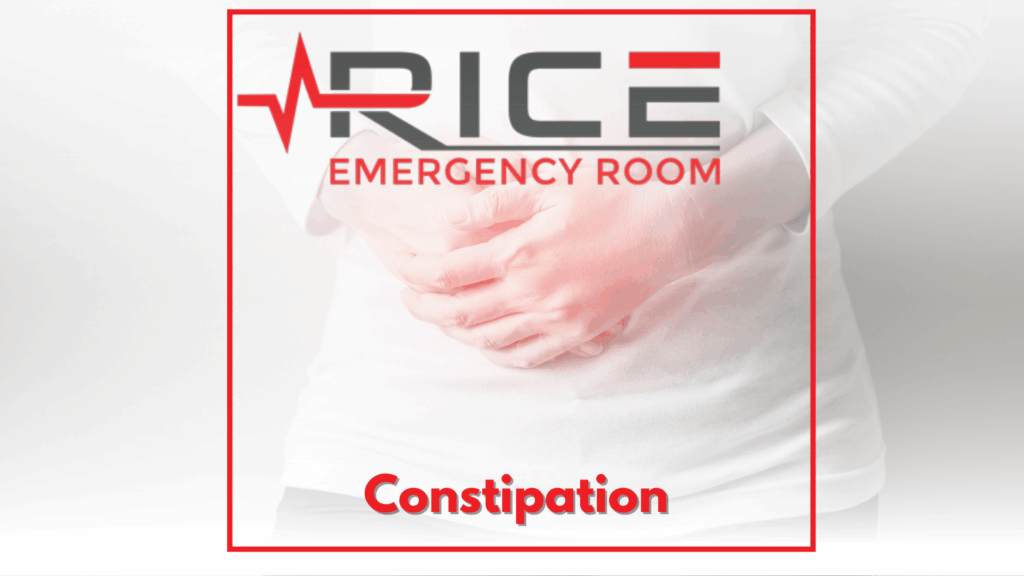Constipation is a common issue that affects both children and adults, often causing discomfort and concern. While it can typically be managed with simple lifestyle changes, there are instances where constipation can signal a more serious underlying condition, requiring immediate medical attention.
Understanding the signs of constipation in children and adults and knowing when it becomes a medical emergency is crucial for maintaining overall health.
Check In Online For Help With Constipation Now. We have an average wait time of 10 minutes and every patient is seen by an Emergency Room Physician.
At Rice Emergency Room, we understand that issues like this can be both uncomfortable and worrying. Our Board Certified Emergency Physicians are available 24/7 to provide immediate care for any concerning symptoms, whether they involve your child or yourself. With state-of-the-art diagnostic tools, including 24/7 radiology and laboratory services, we can quickly assess and treat any underlying conditions to ensure you receive the best care possible.
If you or your child are experiencing severe constipation or any other concerning symptoms, don’t wait—visit Rice Emergency Room for prompt and compassionate care. Your health and well-being are our top priorities.
Constipation in Children: Recognizing the Signs
Constipation in children is not uncommon, especially during times of dietary changes, potty training, or transitions in routine, such as starting school. However, it can be distressing for both the child and the parents.
Signs of Constipation in Children:
- Infrequent Bowel Movements: A child may not have a bowel movement for several days. Generally, children should have at least three bowel movements a week. Anything less may indicate constipation (Mayo Clinic).
- Hard, Dry Stools: When a child finally does have a bowel movement, the stool may be hard, dry, and difficult to pass, often causing pain (American Academy of Pediatrics).
- Stomach Pain and Bloating: A constipated child may complain of stomach pain or discomfort, often accompanied by bloating (Johns Hopkins Medicine).
- Soiling: In some cases, a constipated child may soil their underwear, which can occur when loose stool leaks around the impacted stool in the rectum (Mayo Clinic).
- Straining or Crying During Bowel Movements: If your child seems to be straining excessively or crying when trying to pass stool, it’s a clear sign of constipation (American Academy of Pediatrics).
When to Seek Medical Help for Your Child
While constipation in children is usually not serious, there are times when it warrants a visit to the Doctor or even a trip to the emergency room. You should seek medical attention if your child experiences:
- Severe abdominal pain that doesn’t go away with bowel movements.
- Vomiting along with constipation.
- A noticeable decrease in appetite and overall activity level (Johns Hopkins Medicine).
Constipation in Adults: Recognizing a Medical Emergency
For adults, constipation is often related to diet, lifestyle, or stress. However, it can sometimes be a sign of a more serious health problem, particularly if it’s accompanied by other symptoms.
Signs of Constipation in Adults:
- Infrequent Bowel Movements: Adults typically experience constipation if they have fewer than three bowel movements per week (Mayo Clinic).
- Difficulty Passing Stool: Passing hard, lumpy stools, or feeling as if there’s a blockage in the rectum that prevents stool passage (Cleveland Clinic).
- Abdominal Pain and Bloating: Persistent discomfort in the abdomen, often relieved after a bowel movement, is common (Johns Hopkins Medicine).
- Feeling of Incomplete Evacuation: The sensation that the bowel hasn’t completely emptied can be a sign of constipation (Cleveland Clinic).
When Constipation Becomes a Medical Emergency
While constipation is generally manageable, certain symptoms indicate that it’s time to seek immediate medical attention:
- Severe and Persistent Abdominal Pain: If the pain is intense and doesn’t improve with bowel movements or over-the-counter medications, it may indicate a more serious issue such as a bowel obstruction (Mayo Clinic).
- Vomiting: Vomiting, especially if it’s accompanied by severe abdominal pain and stoppage, can be a sign of a bowel obstruction or other serious condition (Cleveland Clinic).
- Unexplained Weight Loss: If you experience constipation along with rapid, unexplained weight loss, it’s important to see a Doctor immediately (Johns Hopkins Medicine).
 24x7 Available
24x7 Available

